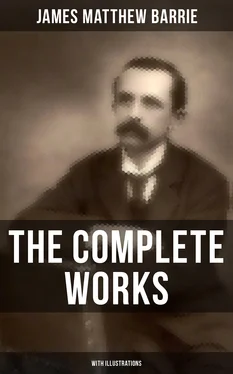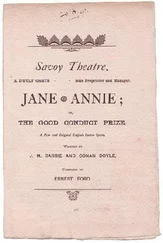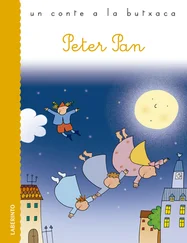Hobart inherited both his bell and his nickname from his father, who was not a native of Thrums. He came from some distant part where the people speak of snecking the door, meaning shut it. In Thrums the word used is steek, and sneck seemed to the inhabitants so droll and ridiculous that Hobart got the name of Snecky. His son left Thrums at the age of ten for the distant farm of Tirl, and did not return until the old bellman's death, twenty years afterwards; but the first remark he overheard on entering the kirkwynd was a conjecture flung across the street by a grey-haired crone, that he would be "little Snecky come to bury auld Snecky."
The father had a reputation in his day for "crying" crimes he was suspected of having committed himself, but the Snecky I knew had too high a sense of his own importance for that. On great occasions, such as the loss of little Davy Dundas, or when a tattie roup had to be cried, he was even offensively inflated; but ordinary announcements, such as the approach of a flying stationer, the roup of a deceased weaver's loom, or the arrival in Thrums of a cart-load of fine "kebec" cheeses, he treated as the merest trifles. I see still the bent legs of the snuffy old man straightening to the tinkle of his bell, and the smirk with which he let the curious populace gather round him. In one hand he ostentatiously displayed the paper on which what he had to cry was written, but, like the minister, he scorned to "read." With the bell carefully tucked under his oxter he gave forth his news in a rasping voice that broke now and again into a squeal. Though Scotch in his unofficial conversation, he was believed to deliver himself on public occasions in the finest English. When trotting from place to place with his news he carried his bell by the tongue as cautiously as if it were a flagon of milk.
Snecky never allowed himself to degenerate into a mere machine. His proclamations were provided by those who employed him, but his soul was his own. Having cried a potato roup he would sometimes add a word of warning, such as, "I wudna advise ye, lads, to hae onything to do wi' thae tatties; they're diseased." Once, just before the cattle market, he was sent round by a local laird to announce that any drover found taking the short cut to the hill through the grounds of Muckle Plowy would be prosecuted to the utmost limits of the law. The people were aghast. "Hoots, lads," Snecky said; "dinna fash yoursels. It's juist a haver o' the grieve's." One of Hobart's ways of striking terror into evil-doers was to announce, when crying a crime, that he himself knew perfectly well who the culprit was. "I see him brawly," he would say, "standing afore me, an' if he disna instantly mak retribution, I am determined this very day to mak a public example of him."
Before the time of the Burke and Hare murders Snecky's father was sent round Thrums to proclaim the startling news that a grave in the kirkyard had been tampered with. The "resurrectionist" scare was at its height then, and the patriarch, who was one of the men in Thrums paid to watch new graves in the night-time, has often told the story. The town was in a ferment as the news spread, and there were fierce suspicious men among Hobart's hearers who already had the rifler of graves in their eye.
He was a man who worked for the farmers when they required an extra hand, and loafed about the square when they could do without him. No one had a good word for him, and lately he had been flush of money. That was sufficient. There was a rush of angry men through the "pend" that led to his habitation, and he was dragged, panting and terrified, to the kirkyard before he understood what it all meant. To the grave they hurried him, and almost without a word handed him a spade. The whole town gathered round the spot—a sullen crowd, the women only breaking the silence with their sobs, and te children clinging to their gowns. The suspected resurrectionist understood what was wanted of him, and, flinging off his jacket, began to reopen the grave. Presently the spade struck upon wood, and by and by part of the coffin came in view. That was nothing, for the resurrectionists had a way of breaking the coffin at one end and drawing out the body with tongs. The digger knew this. He broke the boards with the spade and revealed an arm. The people convinced, he dropped the arm savagely, leapt out of the grave and went his way, leaving them to shovel back the earth themselves. There was humour in the old family as well as in their lodger. I found this out slowly. They used to gather round their peat fire in the evening, after the poultry had gone to sleep on the kitchen rafters, and take off their neighbours. None of them ever laughed; but their neighbours did afford them subject for gossip, and the old man was very sarcastic over other people's old-fashioned ways. When one of the family wanted to go out he did it gradually. He would be sitting "into the fire" browning his corduroy trousers, and he would get up slowly. Then he gazed solemnly before him for a time, and after that, if you watched him narrowly, you would see that he was really moving to the door. Another member of the family took the vacant seat with the same precautions. Will'um, the eldest, has a gun, which customarily stands behind the old eight-day clock; and he takes it with him to the garden to shoot the blackbirds. Long before Will'um is ready to let fly, the blackbirds have gone away; and so the gun is never, never fired: but there is a determined look on Will'um's face when he returns from the garden.
In the stormy days of his youth the old man had been a "Black Nib." The Black Nibs were the persons who agitated against the French war; and the public feeling against them ran strong and deep. In Thrums the local Black Nibs were burned in effigy, and whenever they put their heads out of doors they risked being stoned. Even where the authorities were unprejudiced they were helpless to interfere; and as a rule they were as bitter against the Black Nibs as the populace themselves. Once the patriarch was running through the street with a score of the enemy at his heels, and the bailie, opening his window, shouted to them, "Stane the Black Nib oot o' the toon!"
When the patriarch was a young man he was a follower of pleasure. This is the one thing about him that his family have never been able to understand. A solemn stroll through the kirkyard was not sufficient relaxation in those riotous times, after a hard day at the loom; and he rarely lost a chance of going to see a man hanged. There was a good deal of hanging in those days; and yet the authorities had an ugly way of reprieving condemned men on whom the sightseers had been counting. An air of gloom would gather on my old friend's countenance when he told how he and his contemporaries in Thrums trudged every Saturday for six weeks to the county town, many miles distant, to witness the execution of some criminal in whom they had a local interest, and who, after disappointing them again and again, was said to have been bought off by a friend. His crime had been stolen entrance into a house in Thrums by the chimney, with intent to rob; and, though this old-fashioned family did not see it, not the least noticeable incident in the scrimmage that followed was the prudence of the canny housewife. When she saw the legs coming down the lum, she rushed to the kail-pot which was on the fire and put on the lid. She confessed that this was not done to prevent the visitor's scalding himself, but to save the broth.
The old man was repeated in his three sons. They told his stories precisely as he did himself, taking as long in the telling, and making the points in exactly the same way. By and by they will come to think that they themselves were of those past times. Already the young ones look like contemporaries of their father.
Chapter XI.
Little Rathie's "Bural"
Читать дальше












